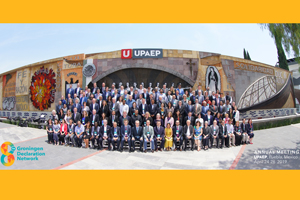
The Eighth Annual Groningen Declaration Network (GDN) Meeting was held in the city of Puebla, Mexico, April 24-26, 2019, at the Universidad Popular Autónoma del Estado de Puebla (UPAEP), located in the iconic UNESCO world heritage city of Puebla. It was a bilingual event, with simultaneous interpretation being offered in English and Spanish, for the first time since its establishment. Participants came from twenty-three countries and included AACRAO staff Mike Reilly, Melanie Gottlieb, Janie Barnett, Tom Green and William Gil.
GDN supports the creation the necessary policy and technical infrastructure for true global mobility for both learner and professional. In Puebla, nearly 40 presentations showcased initiatives and updates around the theme “Creating the New World for Academic and Professional Mobility.” Highlights included presentations from China, a country of interest to the international education community in the United States based on the sheer volume of Chinese students studying here.
The CSCSE in China
The scale of mobility as it impacts China is enormous. Based on Project Atlas (2018) data, China is a top sending country, with more than 662 thousand students studying overseas; that same year, 519 thousand students returned to China with their foreign credentials. Foreign credentials in China are evaluated by the Chinese Service for Scholarly Exchange (CSCSE). In 2018; 253,000 students (97% Chinese nationals) requested their foreign credentials be evaluated by the CSCSE, a 40% increase over the previous year.
In order for a Chinese national to gain employment in China after a foreign education, they must have an evaluation report by the CSCSCE. To more efficiently serve these students, the CSCSE recently changed their documentation policy to no longer require the original documents; students can share digital copies of documents that they have in their possession for evaluation.
Through contacts gained through the GDN, CSCSE uses an electronic verification process to verify the unofficial documents they receive from their students. New verification processes and alignment with national degree databases all over the world have reduced the number of forged documents received by half. Their processing time is approximately of 10-20 working days. In that time, they are able to verify just under 80% of the documents that they receive, and are working towards a goal of 100% electronic verification of educational documents.
CSCSE also plays a growing role in helping students to choose their study abroad institutions. Since all foreign degrees must be evaluated by the CSCSE, students are increasingly turning to the agency for pre-departure vetting of institutions and degrees. While the majority of students in China still use agents, the CSCSE recognize that not all agents operate ethically or in the best interests of the students and their families. The agency strives to add additional resources in order to do a better job to guide students to make informed choices in selecting the best programs to fit their educational and employment goals. It is through connections they have made by participating at GDN and AACRAO meetings that they are gaining a deeper understanding of global higher education quality assurance systems to better serve their students.